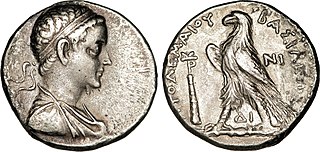
Philip V was king (Basileus) of the ancient Kingdom of Macedonia from 221 to 179 BC. Philip's reign was principally marked by an unsuccessful struggle with the emerging power of the Roman Republic. He would lead Macedon against Rome in the First and Second Macedonian Wars, losing both but allying with Rome in the Roman-Seleucid War towards the end of his reign.

Euthydemus I was a Greco-Bactrian king in about 230 or 223 BC according to Polybius; he is thought to have originally been a satrap of Sogdiana who overturned the dynasty of Diodotus of Bactria and became a Greco-Bactrian king. Strabo, on the other hand, correlates his accession with internal Seleucid wars in 223–221 BC. His kingdom seems to have been substantial, including probably Sogdiana to the north, and Margiana and Ariana to the south or east of Bactria.

The Attalid dynasty was a Hellenistic dynasty that ruled the city of Pergamon in Asia Minor after the death of Lysimachus, a general of Alexander the Great.
Attalus IIIPhilometor Euergetes was the last Attalid king of Pergamon, ruling from 138 BC to 133 BC.
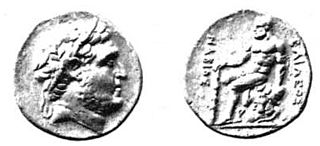
Nabis was ruler of Sparta from 207 BC to 192 BC, during the years of the First and Second Macedonian Wars and the eponymous "War against Nabis", i.e. against him. After taking the throne by executing two claimants, he began rebuilding Sparta's power. During the Second Macedonian War, he sided with King Philip V of Macedon and in return he received the city of Argos. However, when the war began to turn against the Macedonians, he defected to Rome. After the war, the Romans, urged by the Achaean League, attacked Nabis and defeated him. He then was assassinated in 192 BC by the Aetolian League and was Sparta's last independent ruler. He represented the last phase of Sparta's reformist period.
Eumenes III was a pretender to the throne of Pergamon. He led a revolt against the Pergamene regime and found success early on, seizing various cities near the coast of Anatolia, including the island of Samos, and killing the Roman consul Publius Licinius Crassus Dives Mucianus. However, the revolt was eventually quelled by the Roman Republic in 129 BCE when it dispatched the experienced Marcus Perperna to the region.
Demetrius of Pharos was a ruler of Pharos involved in the First Illyrian War, after which he ruled a portion of the Illyrian Adriatic coast on behalf of the Romans, as a client king.
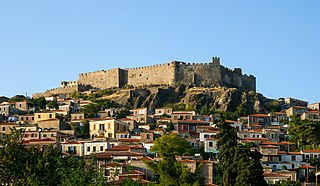
Mithymna is a town and former municipality on the island of Lesbos, North Aegean, Greece. Since the 2011 local government reform it is part of the municipality Lesbos, of which it is a municipal unit. Before 1919, its official name was Μόλυβος - Molyvos; that name dates back to the end of the Byzantine Era, but is still in common use today.
Mithridates IV of Pontus, sometimes known by his full name Mithridates Philopator Philadelphus, was a prince and sixth ruler of the Kingdom of Pontus.

Pharnaces I, fifth king of Pontus, was of Persian and Greek ancestry. He was the son of King Mithridates III of Pontus and his wife Laodice, whom he succeeded on the throne. Pharnaces had two siblings: a brother called Mithridates IV of Pontus and a sister called Laodice who both succeeded Pharnaces. He was born and raised in the Kingdom of Pontus.
Mithridates II, third king of Pontus and son of Ariobarzanes, whom he succeeded on the throne.
Marcus Perperna, Roman consul in 130 BC, is said to have been a consul before he was a citizen; for Valerius Maximus relates, that the father of this Perperna was condemned under the lex Papia after the death of his son, because he had falsely usurped the rights of a Roman citizen.

Molon or Molo was a general and satrap of the Seleucid king Antiochus the Great. He held the satrapy of Media at the accession of that monarch ; in addition to which, Antiochus conferred upon him and his brother Alexander the government of all the upper provinces of his empire. But their hatred of Hermeias, the chief minister of Antiochus, soon led them both to revolt in 222 BC. The two generals at first sent against them by the king were unable to oppose their progress, and Molon found himself at the head of a large army, and master of the whole country to the east of the Tigris.

Ariarathes V Eusebes Philopator was a son of the preceding king Ariarathes IV of Cappadocia and queen Antiochis. He was distinguished by his contemporaries for his excellence of his character and his cultivation of philosophy and the liberal arts and is considered by some historians to have been the greatest of the kings of Cappadocia.
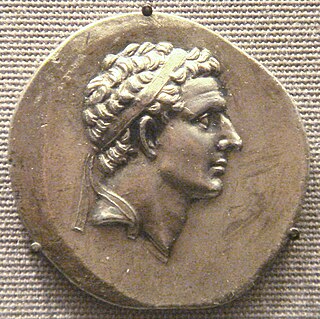
Orophernes Nicephorus was one of the two sons Antiochis pretended to have had with Ariarathes IV, the king of Cappadocia because she failed to have children. However, she then did bear a child, Mithridates, and told her husband about the fake sons. These were sent to Rome and Ionia respectively to avoid a succession dispute with the legitimate son, whose name was changed to Ariarathes and who succeeded his father as Ariarathes V in 163 BC. A few years later Orophernes deposed him with the help of Demetrius I Soter, who became the king of the Syria-based Seleucid Empire in 161 BC when he overthrew Antiochus V, an underage king, and his regent, Lysias. The reign of Orophernes was short-lived. The Romans restored Ariarathes V.

Ariarathes IV, surnamed Eusebes, "the Pious",, was the king of Cappadocia in 220–163 BC.
Aristonicus of Alexandria was a distinguished Greek grammarian who lived during the reigns of Augustus and Tiberius, contemporary with Strabo. He taught at Rome, and wrote commentaries and grammatical treatises.

Attalus I, surnamed Soter ruled Pergamon, an Ionian Greek polis, first as dynast, later as king, from 241 BC to 197 BC. He was the first cousin once removed and the adoptive son of Eumenes I, whom he succeeded, and was the first of the Attalid dynasty to assume the title of king in 238 BC. He was the son of Attalus and his wife Antiochis.
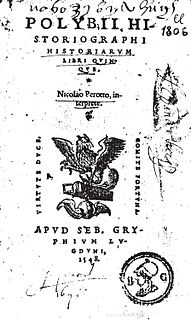
Polybius’ Histories were originally written in 40 volumes, only the first five of which are extant in their entirety. The bulk of the work was passed down through collections of excerpts kept in libraries in Byzantium. Polybius, a historian from the Greek city of Megalopolis in Arcadia, was taken as a hostage to Rome after the Roman defeat of the Achaean League, and there he began to write an account of the rise of Rome to a world power.

